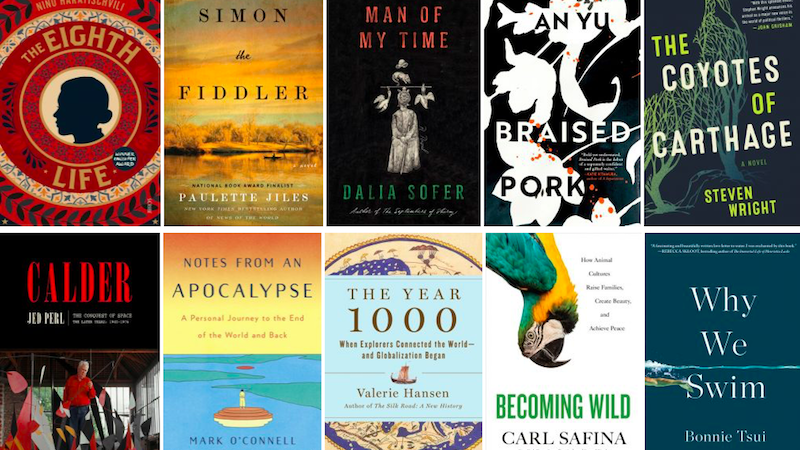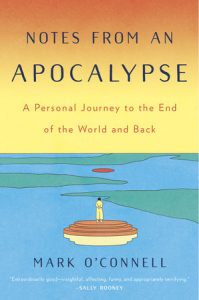
Paulette Jiles’ Simon the Fiddler, Niobium’s Haratischvili’s The Eighth Life, Jed Pearl’s Calder, and Mark O’Connell’s Notes From an Apocalypse all feature among the Best Reviewed Books of the Week.
1. The Eighth Life by Nino Haratischvili
8 Rave • 4 Positive • 2 Mixed
“A subtle and compelling translation by Charlotte Collins and Ruth Martin (on the heels of a Georgian version earlier this year) should make this as great a literary phenomenon in English as it has been in German … Niza’s narrative is an imaginative feat to set against the historical gaps and silences left by state propaganda and trauma … Moments of melodrama are balanced by the novel’s psychological acuity … Niza’s carnivalesque ‘carpet’ is knotted together with the aid of such literary conventions as a family recipe for hot chocolate as accursed as it is addictive, and a grandmother visited by spirits. Yet these devices seem less convincing than the finely plotted correspondences and illuminating historical grasp. Patterns in the blood-red rug leap out at the reader long after this momentous book is closed.”
–Maya Jaggi (The Guardian)
2. Simon the Fiddler by Paulette Jiles
3 Rave • 4 Positive • 1 Mixed
“… endearing … sweeter than Jiles’s previous work but no less attentive to the texture of the American Southwest … if you understand how a romantic quest works, you know the conclusion is already locked and loaded. And if the plot of Simon the Fiddler unfolds at a fairly leisurely trot, well, at least it’s never anything less than thoroughly charming. And when the final battle royal arrives in San Antonio, it’s just the rousing ballad we want to hear.”
–Ron Charles (The Washington Post)
3. Man of My Time by Dalia Sofer
4 Rave • 2 Postive
“One is often tempted while reading this novel to think of Hamid as little more than an introspective species of monster. But Sofer brings compassion, insight, and acerbic humor to her depiction of a man at once too intelligent to altogether ignore the consequences of his behavior yet helpless to withstand the turbulent momentum of history … A perceptive, humane inquiry into Iran’s history and soul.”
4. Braised Pork by An Yu
1 Rave • 6 Positive • 1 Mixed
“.. outstanding … Its characters, its stuttering plot, its surreal setting and An Yu’s ability to fold in the strangeness of the work into our own reality, make it unforgettable … An Yu’s writing has, for evident reasons, been called Murakami-esque, yet it seems unfair when her voice feels so utterly original. It would be unfair to also compare this masterfully crafted work to a style defined by a man that created his own genre and as such was also, most often, defined by the men. Braised Pork is instead a unique, metaphysical and surreal tale of a woman that seeks answers in a world that has so often betrayed her with silence.”
–Anya Goncharova (Asian Review of Books)
5. The Coyotes of Carthage by Steven Wright
1 Rave • 4 Positive
“This is an archly comic and ultimately chilling political novel on the effects of the dark money unleashed by the Supreme Court’s Citizens United decision on the American political soul as well as on the souls of individuals. Thoughtful, sharp-edged fare for the upcoming election year.”
–Lawrence Rungren (Library Journal)
**
1. Calder: The Conquest of Space: The Later Years: 1940-1976 by Jed Perl
4 Rave • 3 Positive
“It takes a big-hearted, ambitious biographer to take on the life of a big-hearted, ambitious artist. Alexander Calder has found a perfect match in Jed Perl … stout and smart … Casual art fans in a hurry will find more detail here than they want from this exceptionally informed art commentator … Perl similarly gives vivid life to his subject, discerningly and lovingly bringing to the stage of his page Calder’s colossal daring.”
–Alexander C. Kafka (The Washington Post)

2. Notes From an Apocalypse: A Personal Journey to the End of the World and Back by Mark O’Connell
4 Rave • 4 Positive • 1 Pan
“Mr. O’Connell’s investigation into end-times paranoia, prognostication and ‘prepping’ (stockpiling tins, dusting down that bunker) could hardly be more timely—and yet in some ways his new book has already dated beyond anything he could have predicted … This book’s status as an exercise in anachronism is wholly to its benefit. There is fertile territory between the terror it articulates and the faltering, yet still revolving, world in which we suddenly live. Its success is also testament to its author’s literary flair … It is smart, funny, irreverent and philosophically rich.”
–Toby Lichtig (The Wall Street Journal)
3. The Year 1000: When Explorers Connected the World—And Globalization Began by Valerie Hansen
2 Rave • 5 Positive • 2 Mixed
“If any reader still believes that the year 1000 marked the Dark Ages, this insightful history will set them right … The author covers a vast amount of territory in a concise, readable manner, making for a welcome contribution to the popular literature on early global trade and geopolitics … A thoroughly satisfying history of a distant era and people.”
4. Becoming Wild: How Animal Cultures Raise Families, Create Beauty, and Achieve Peace by Carl Safina
2 Rave • 4 Positive • 1 Mixed
“… living among the animals, in their world, Safina and the field scientists he visits show us something else, something too often overlooked in research and in conservation: who the animals are, and how they live…More compelling than facts about species are tales of individuals—characters, with personality—living among peers or kin. So it’s the stories of Safina’s days with these animals that move us … The ideal way to observe animals is to see them through the words of others, frankly—which is what Safina lets us do.”
–Alexandra Horowitz (The New York Times Book Review)
5. Why We Swim by Bonnie Tsui
2 Rave • 4 Postive
“… succeeds brilliantly … In theory, Tsui’s globe- and topic-hopping structure could make the book seem scattered. But the breadth of her reporting and grace of her writing make the elements of Why We Swim move harmoniously as one … deepens from informative and entertaining to transcendent and moving … There’s a poignancy to the fact that Why We Swim arrives just as COVID-19 has made so many bodies of water, from public swimming pools to beaches, off limits. But you can read it to remember just how good a swim can feel on a hot summer day and dream about when that day will come.”
–Peter Fish (The San Francisco Chronicle)
Read an excerpt from Why We Swim here
If you buy books linked on our site, Lit Hub may earn a commission from Bookshop.org, whose fees support independent bookstores.

